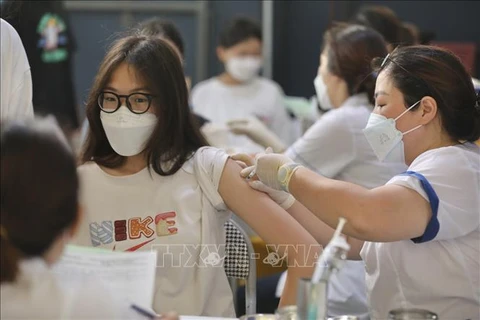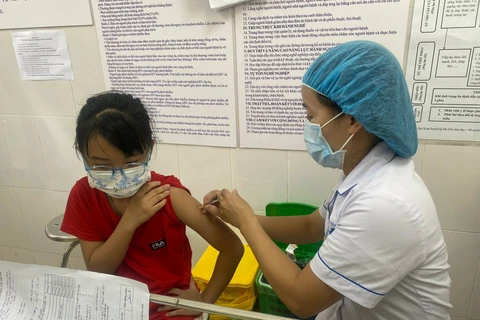 After more than two years of fighting the COVID-19 pandemic, Vietnam has successfully controlled the pandemic. (Photo: VNA)
After more than two years of fighting the COVID-19 pandemic, Vietnam has successfully controlled the pandemic. (Photo: VNA) Hanoi (VNA) - Countries worldwide can learn from Vietnam's COVID-19 pandemic prevention and control experience, said Chief Representative of the World Health Organisation (WHO) in Vietnam, Dr Angela Pratt.
A mobile medical team comes to each house to give vaccination (Photo: VNA)
After more than two years of fighting the COVID-19 pandemic, Vietnam has successfully controlled it, maintained stability in all aspects, and achieved rapid recovery and sustainable development despite various difficulties and challenges from complicated global and regional developments.
Vietnam has done very well in controlling the pandemic, Angela Pratt said, adding that since the emergence of COVID-19, the country has taken strong measures to protect public health.
According to the WHO official, early detection, quick response to infections and clusters, good supervision and inspection capacity, strong border control and social contact restrictions prevented virus transmission. In addition, people were asked to wear masks regularly while healthcare services were provided promptly. These measures kept the number of infections and deaths during the COVID-19 outbreak low.
When vaccines were available, Vietnam deployed a massive vaccination drive and quickly achieved high vaccine coverage. As a result, more than 260 million vaccine doses have been administered so far, making Vietnam one of the countries with the highest vaccination rates worldwide.
The rate of people receiving two vaccine doses now climbs to over 85% from only 16% one year earlier, she said, attributing these remarkable results to the management and commitments of the Government.
The Vietnamese Government has adopted many timely and appropriate policies and guidelines, including Resolution No. 128/NQ-CP on safe, flexible adaptation to and effective control of the pandemic.
She noted that the country has been consistent with these measures and effectively implemented them.
Angela Pratt said Resolution 128 was a significant milestone for Vietnam in COVID-19 prevention and control. It shifted from controlling the spread of the virus at all costs to living with the disease.
She said that Vietnam chose sustainable management to balance COVID-19 control measures and resume socio-economic activities.
She praised Resolution 128 as it firstly helped Vietnam achieve a high vaccination rate which has increased over time.
Secondly, the country successfully controlled the spread of the virus from the very beginning of the pandemic, thanks to social distancing and preventive measures in public places.
 Chief Representative of the World Health Organisation (WHO) in Vietnam, Dr Angela Pratt. (Photo: VGP)
Chief Representative of the World Health Organisation (WHO) in Vietnam, Dr Angela Pratt. (Photo: VGP) In addition, the resolution came after extensive consultation with the Government, ministries, sectors, international partners and local authorities.
"This is one of the most important lessons we have learned in the fight against COVID-19 because the health sector could not cope with COVID-19 alone. It needs the cooperation of the whole society," she said.
The WHO representative said Resolution 128 helped Vietnam balance social development and public health measures.
The WHO official also praised the tireless efforts of health staff, saying that with the support of other sectors, they worked around the clock without a day off.
Chief Representative of the World Health Organisation (WHO) in Vietnam, Dr. Angela Pratt (Photo: VGP)
She said countries worldwide could learn from Vietnam's pandemic prevention and control experience. These lessons need to be promoted to respond to possible epidemics in the future.
COVID-19 is an unprecedented pandemic affecting all economic, cultural and social aspects. So far, more than 612 million people worldwide have been infected with the coronavirus, of whom more than 6.5 million have died.
Since the pandemic broke out, Vietnam has recorded nearly 11.5 million infections, ranking 13 out of the 230 countries and territories. Regarding the rate of infections per million people, Vietnam comes in 115th, with 115,631 infections per 1 million people on average.
The country also ranks 26th in the number of COVID-19-related deaths. The death rate among the total number of cases in Vietnam is 0.02%, while the world average is approximately 1.2%.
The above results were attributed to an appropriate and effective vaccination strategy with the determination of the entire political system and people said the WHO./.






















